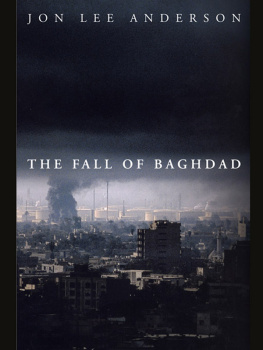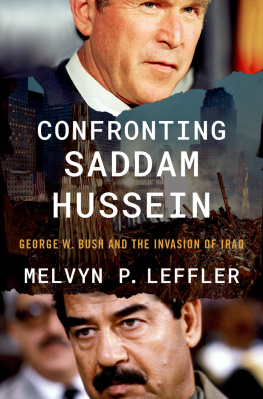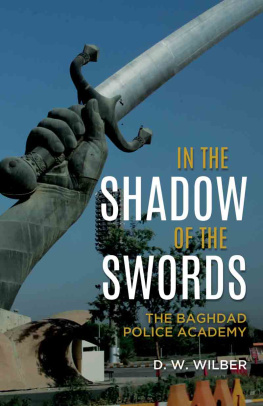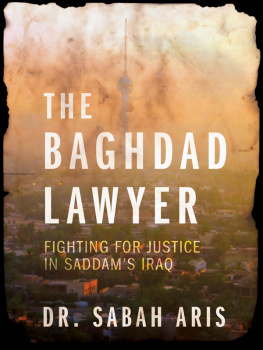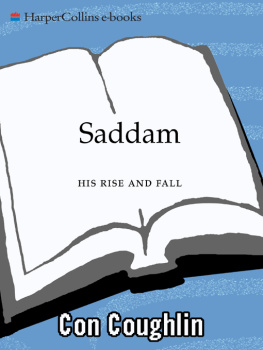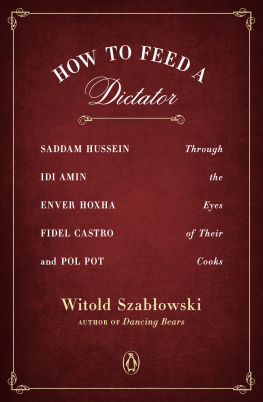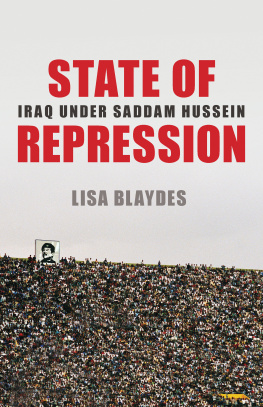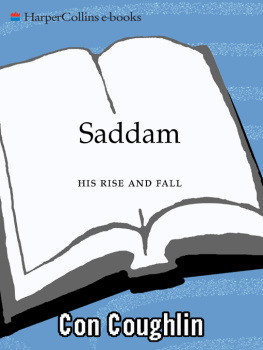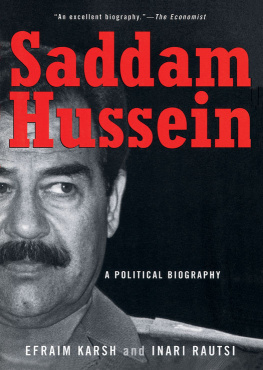Hussein Saddam - The Fall of Baghdad
Here you can read online Hussein Saddam - The Fall of Baghdad full text of the book (entire story) in english for free. Download pdf and epub, get meaning, cover and reviews about this ebook. City: New York;Iraq, year: 2004, publisher: Penguin Publishing Group;Penguin Press, genre: Art. Description of the work, (preface) as well as reviews are available. Best literature library LitArk.com created for fans of good reading and offers a wide selection of genres:
Romance novel
Science fiction
Adventure
Detective
Science
History
Home and family
Prose
Art
Politics
Computer
Non-fiction
Religion
Business
Children
Humor
Choose a favorite category and find really read worthwhile books. Enjoy immersion in the world of imagination, feel the emotions of the characters or learn something new for yourself, make an fascinating discovery.
- Book:The Fall of Baghdad
- Author:
- Publisher:Penguin Publishing Group;Penguin Press
- Genre:
- Year:2004
- City:New York;Iraq
- Rating:5 / 5
- Favourites:Add to favourites
- Your mark:
- 100
- 1
- 2
- 3
- 4
- 5
The Fall of Baghdad: summary, description and annotation
We offer to read an annotation, description, summary or preface (depends on what the author of the book "The Fall of Baghdad" wrote himself). If you haven't found the necessary information about the book — write in the comments, we will try to find it.
The Fall of Baghdad — read online for free the complete book (whole text) full work
Below is the text of the book, divided by pages. System saving the place of the last page read, allows you to conveniently read the book "The Fall of Baghdad" online for free, without having to search again every time where you left off. Put a bookmark, and you can go to the page where you finished reading at any time.
Font size:
Interval:
Bookmark:
THE PENGUIN PRESS
Published by the Penguin Group
Penguin Group (USA) Inc., 375 Hudson Street, New York, New York 10014, U.S.A.
Penguin Group (Canada), 10 Alcorn Avenue,Toronto, Ontario, Canada M4V 3B2 (a division of Pearson Penguin Canada Inc.) Penguin Books Ltd, 80 Strand, London WC2R 0RL, England Penguin Ireland, 25 St. Stephens Green, Dublin 2, Ireland (a division of Penguin Books Ltd) Penguin Books Australia Ltd, 250 Camberwell Road, Camberwell, Victoria 3124, Australia (a division of Pearson Australia Group Pty Ltd) Penguin Books India Pvt Ltd, 11 Community Centre, Panchsheel Park, New Delhi110 017, India Penguin Group (NZ), Cnr Airborne and Rosedale Roads, Albany, Auckland, New Zealand (a division of Pearson New Zealand Ltd) Penguin Books (South Africa) (Pty) Ltd, 24 Sturdee Avenue, Rosebank, Johannesburg 2196, South Africa
Penguin Books Ltd, Registered Offices:
80 Strand, London WC2R 0RL, England
First published in 2004 by The Penguin Press,
a member of Penguin Group (USA) Inc.
Copyright Jon Lee Anderson, 2004
All rights reserved
LIBRARY OF CONGRESS CATALOGING-IN-PUBLICATION DATA
Anderson, Jon Lee.
The fall of Baghdad /Jon Lee Anderson.
p. cm.
Includes index.
ISBN 978-1-1012-0094-0
Designed by Claire Naylon Vaccaro Without limiting the rights under copyright reserved above, no part of this publication may be reproduced, stored in or introduced into a retrieval system, or transmitted, in any form or by any means (electronic, mechanical, photocopying, recording, or otherwise), without the prior written permission of both the copyright owner and the above publisher of this book. The scanning, uploading, and distribution of this book via the Internet or via any other means without the permission of the publisher is illegal and punishable by law. Please purchase only authorized electronic editions and do not participate in or encourage electronic piracy of copyrightable materials. Your support of the authors rights is appreciated.
Making or distributing electronic copies of this book constitutes copyright infringement and could subject the infringer to criminal and civil liability.
Visit our web site at www.penguinputnam.com
Also by Jon Lee Anderson
The Lions Grave: Dispatches from Afghanistan
Che Guevara: A Revolutionary Life
Guerrillas: Journeys in the Insurgent World
Inside the League(with Scott Anderson)
War Zones (with Scott Anderson)
To Erica, Bella, Rosie, and Mximo
I first traveled to Iraq because of the phenomenon of Saddam Hussein. In a sense Saddam inhabited a mythological realm, like a throwback to Herods day, when warrior kings reigned as semidivine creatures, malevolent and munificent all at once, capable of the greatest cruelties as well as the most extravagant gestures of patronage. There he was, at the dawn of the twenty-first century, a head of state who was indisputably a war criminal, an international fugitive who lived a clandestine life in his own nation and who survived in power thanks tonot in spite ofthe terror he inspired in his people. Anything that could be said of Saddam had become, somehow, believable.
I wanted to witness Saddams tyranny and to understand what made it work. I was also drawn by a feeling of certainty that there would inevitably be a new war between the United States and Iraq. It was something that had been preordained, I believed, since the Gulf War, when Iraqs army was defeated and yet Saddam had been allowed to remain in power. By the time George W. Bush was sworn into office in January 2001, it was clear that the UN sanctions regime that had held Saddam in check for the past decade had run its course and that a new means of dealing with him had to be found. As we now know, Bush had already decided that the best thing to do was to go to war and to get rid of Saddam Hussein.
This book is my account of that war, about what led up to it and what has happened in Iraq since it occurred. Iraqs story is still an unfolding one, of course, and now it has also become an American story. By invading and occupying Iraq, the United States has fused its destiny with Iraqs for the foreseeable future. What shape the relationship will take and how long it will last are things none of us can yet know, but so far it has been an unhappy encounter.
Most of all, this book is about a handful of people I came to know in the ancient city of Baghdad during one of the most tumultuous and decisive periods in its long history. When I first got to know them, they were inhabitants of Saddams Iraq, and most had survived by collaborating in one way or another with the regime. The perverse beauty of Saddams special brand of tyranny was that Iraqis were obliged to be participants in the very system that oppressed them. Most assuaged their consciences by telling themselves that they had no other alternative because they had families to support and to protect, and because the only other option was prison, exile, or perhaps death. A few of the Iraqis I came to know followed the latter path. For all of them, the drastic changes brought by the war and the fall of Saddam meant an abrupt end to the lives they had known until then. For some it represented a new beginning, but for others it was the end of the road. Their stories are here. In the ongoing trauma of post-Saddam Iraq, a new country is emerging, and each day brings with it new endings and new beginnings, and not just for Iraqis but for Americans too.

N asser al-Sadoun lived in a secluded limestone villa on the outskirts of the Jordanian capital of Amman with his wife, Tamara, their two German shepherds, and a Sri Lankan maid named Daphne. From their house, they enjoyed a sweeping westerly view over a panorama of rolling stony hills dotted with scrub pines and olive trees. Just beyond the last of these hills, the land falls away into the deep cleft of the Great Rift Valley, where the river Jordan and the Dead Sea straddle the present-day border with Israel. When I first visited him, a few months before the Iraq War began, in early November 2002, Nasser proudly showed me around his living room, which was festooned with old muskets, swords, battleaxes, and other family heirlooms. He pointed out two of his most prized possessions, a pair of spiked bronze helmets that dated from the seventh-century Islamic wars that ensued after the Prophet Muhammads proclamation of the birth of Islam in A.D. 610. On a sideboard stood a personal photograph of Iraqs ill-fated last king, Faisal II, shirtless, smiling, on water skis, taken not long before he was murdered along with most of his family in the revolution of 1958. On the walls hung framed portraits of other illustrious ancestorssheikhs and pashas and royal guard commanders, all bearded, all wearing dashing robes with daggersfrom the late nineteenth and early twentieth centuries, when Iraq was still called Mesopotamia.
Nasser, a handsome, silver-haired man in his late sixties, is a descendant of a legendary Sunni Muslim clan that once possessed its own sheikhdom, called the Muntafiq, which had ruled over most of southern Iraq for four centuries. One of his great-uncles had served as prime minister of Iraq four times in the early twentieth century, and his Dagestani-born grandfather had been the commander of the kings army. Nasser is also a direct descendantthirty-sixth in a direct lineof the Prophet Muhammad. He pointed out, teasingly, that the late King Hussein of Jordan, a distant relative of his, was only forty-third. Nasser displayed a kind of rueful good humor about his familys decline and fall, attributing it to a woeful penchant for making bad choices: We used to rule over an area in the south of Iraq that was larger than England and Wales put together. But we made one mistake, which was to side with the Turks against the British, and so we lost our land, our powers, and our land was distributed to other tribes.... One of my grandfathers took Kuwait, stayed a few days, and left again, saying: Its not worth staying here. That was a few years before they discovered oil. Nasser chuckled and threw up his hands in a fatalistic way, with no trace of bitterness.
Font size:
Interval:
Bookmark:
Similar books «The Fall of Baghdad»
Look at similar books to The Fall of Baghdad. We have selected literature similar in name and meaning in the hope of providing readers with more options to find new, interesting, not yet read works.
Discussion, reviews of the book The Fall of Baghdad and just readers' own opinions. Leave your comments, write what you think about the work, its meaning or the main characters. Specify what exactly you liked and what you didn't like, and why you think so.

